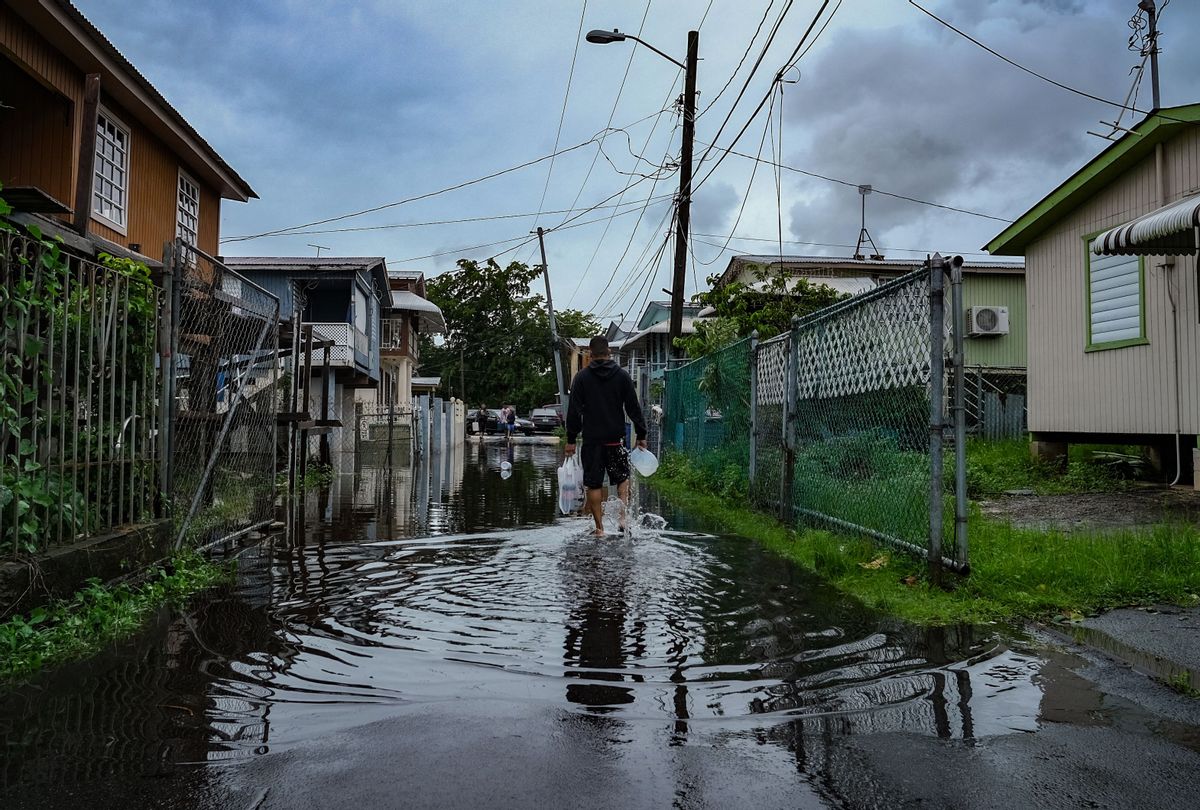As Hurricane Ian rapidly intensifies and barrels toward Florida and the American southeast, public officials are warning that much like Hurricane Fiona in Puerto Rico, the storm will cause severe flooding. Tampa Mayor Jane Castor, D-Fla., warned of "unprecedented flooding" with "18-20 inches of rainwater" while Gov. Ron DeSantis, R-Fla., informed residents in many southern counties that the storm "is going to have major, major impacts in terms of wind, in terms of rain, in terms of flooding." The state's most populous city, Jacksonville, is already reporting flooding and power outages, while the flooding is reportedly severe in the Florida Keys.
The scientists who spoke to Salon about the tropical storm agreed that there is going to be a lot more flooding as Hurricane Ian continues to make landfall. Indeed, as climate change continues to worsen, more and more regions of the country will experience flooding — and the many public health crises that accompany it.
"Apart from physical damages to infrastructure, freshwater lagoons and reservoirs may get contaminated by salt water," Dr. Ali S. Akanda — an associate professor at and graduate director of the Civil & Environmental Engineering Department at the University of Rhode Island — told Salon by email. "Areas with damaged water/sanitation services would be at high risk of waterborne infections."
Dr. Michael E. Mann, a climate scientist and director of the Center for Science, Sustainability and the Media at the University of Pennsylvania, warned that regions hit by the hurricane may experience water quality problems similar to those recently endured in Jackson, Mississippi. In that southeastern city, roughly 150,000 people were left without safe drinking water because the unprecedented rainfall overwhelmed a key pump at the local water treatment plant. Despite water pressure being restored, residents in affected areas are still being urged to boil their water.
"Jackson, Mississippi provides one example of the devastating consequences that come with worse flooding events, which can have detrimental impacts on water quality and human health," Mann wrote to Salon.
Dr. Kevin Trenberth of the National Center for Atmospheric Research (NCAR) pointed out by email that "too much rain overwhelms treatment systems and floods them with contaminated water as rainwaters flow over land surface rather than filter through sand and soils." He added that, in heavily agricultural areas, local contaminants like cattle droppings can also become an issue.
"Too much rain overwhelms treatment systems and floods them with contaminated water as rainwaters flow over land surface rather than filter through sand and soils."
Climate change is expected to cause increased flooding through tropical storms for the foreseeable future, but this anticipated surge in floods will not be limited to hurricane season. After historic flooding occurred at Yellowstone National Park in June, experts pointed out that climate change leads to warmer air that in turn holds more water vapor; which is why climate change leads to more extreme weather events. This means that, even in landlocked areas like the state of Wyoming, one can expect high levels of flooding even where they were never a regular occurrence.
"Every flooding event is unique and it can be difficult to relate trends in flooding to trends in extreme precipitation," Michael Wehner, a senior scientist in the Computational Research Division at the Lawrence Berkeley National Laboratory who extensively studies climate change data, told Salon by email. He pointed out that some rivers have been engineered to control floods, while others have not. "That being said, it is clear to me that the '100 year flood maps' based on historical data and often used for insurance mandates are generally out of date if they do not take climate change into account."
Want more health and science stories in your inbox? Subscribe to Salon's weekly newsletter The Vulgar Scientist.
Even when extreme weather does not lead to flooding, climate change will still cause flooding through more anodyne processes. As ice sheets continue to melt and sea levels rise more generally, hundreds of millions of people who live in coastal areas will be flooded out of their homes. This will happen either because the newly-elevated sea levels will literally put their communities permanently underwater, or they'll simply experience more frequent flooding events.
As flooding becomes more common and more severe, there are basic steps that everyone can take to protect themselves.
"We know in Florida that we have rural/low-income communities, immigrant communities, and communities of color that are low income that live in coastal areas that are both susceptible to extreme weather and flooding events now and even more so in the future."
"There are a lot of things that people can do to protect themselves from hurricanes, which are always communicated by associated agencies – make sure your resources are stockpiled for a few days, make sure you have enough things like medications, pet food, water, batteries, a generator, etc," Dr. Alison E. Adams, an assistant professor of Community & Environmental Sociology at the University of Florida, told Salon by email.
She added that her own research focuses on helping particularly vulnerable communities prepare for these floods.
"We know in Florida that we have rural/low-income communities, immigrant communities and communities of color that are low income that live in coastal areas that are both susceptible to extreme weather and flooding events now and even more so in the future," Adams explained. "And some of these communities are facing impending in-land or other migration to be safe from issues like sea level rise and increased hazards from coastal climate change environmental hazards." Individuals in these situations will need quality infrastructure and effective outreach efforts "to help these vulnerable communities protect themselves in these scenarios."



Shares